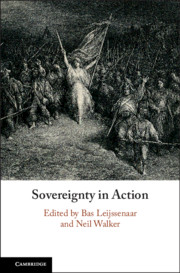80 results
Europe’s constitutional retrofit
-
- Journal:
- Global Constitutionalism , First View
- Published online by Cambridge University Press:
- 06 October 2023, pp. 1-10
-
- Article
-
- You have access
- Open access
- HTML
- Export citation
Law and Political Imagination: The Perspective of Paul Kahn
-
- Journal:
- German Law Journal / Volume 24 / Issue 4 / May 2023
- Published online by Cambridge University Press:
- 26 June 2023, pp. 619-622
-
- Article
-
- You have access
- Open access
- HTML
- Export citation
14 - Three Registers of the Material Constitution
- from Part II - Challenges
-
-
- Book:
- The Cambridge Handbook on the Material Constitution
- Published online:
- 15 January 2023
- Print publication:
- 05 January 2023, pp 210-222
-
- Chapter
- Export citation
Legalising inter-legality
-
- Journal:
- European Law Open / Volume 1 / Issue 1 / March 2022
- Published online by Cambridge University Press:
- 06 April 2022, pp. 216-227
-
- Article
-
- You have access
- Open access
- HTML
- Export citation
15 - Cosmopolitan Attachments
- from Part III - Crossing Boundaries
-
-
- Book:
- A Cosmopolitan Jurisprudence
- Published online:
- 10 December 2021
- Print publication:
- 16 December 2021, pp 280-291
-
- Chapter
- Export citation
1 - The Crisis of Democratic Leadership in Times of Pandemic
- from Part I - Power
-
-
- Book:
- Democracy in Times of Pandemic
- Published online:
- 04 November 2020
- Print publication:
- 12 November 2020, pp 23-37
-
- Chapter
- Export citation
Neutron Star Extreme Matter Observatory: A kilohertz-band gravitational-wave detector in the global network
- Part of
-
- Journal:
- Publications of the Astronomical Society of Australia / Volume 37 / 2020
- Published online by Cambridge University Press:
- 05 November 2020, e047
-
- Article
-
- You have access
- HTML
- Export citation
Angelica Maria Bernal: Beyond Origins: Rethinking Foundations in a Time of Constitutional Democracy. (New York: Oxford University Press, 2017. Pp xii, 274.)
-
- Journal:
- The Review of Politics / Volume 81 / Issue 3 / Summer 2019
- Published online by Cambridge University Press:
- 22 July 2019, pp. 542-545
-
- Article
- Export citation
2 - When Sovereigns Stir
- from Part I - Theory in History
-
-
- Book:
- Sovereignty in Action
- Published online:
- 07 July 2019
- Print publication:
- 18 July 2019, pp 31-64
-
- Chapter
- Export citation
Index
-
- Book:
- Sovereignty in Action
- Published online:
- 07 July 2019
- Print publication:
- 18 July 2019, pp 227-236
-
- Chapter
- Export citation
Introduction
-
-
- Book:
- Sovereignty in Action
- Published online:
- 07 July 2019
- Print publication:
- 18 July 2019, pp 1-14
-
- Chapter
- Export citation
Copyright page
-
- Book:
- Sovereignty in Action
- Published online:
- 07 July 2019
- Print publication:
- 18 July 2019, pp iv-iv
-
- Chapter
- Export citation
Contributors
-
- Book:
- Sovereignty in Action
- Published online:
- 07 July 2019
- Print publication:
- 18 July 2019, pp vii-viii
-
- Chapter
- Export citation
Part II - History of Theory
-
- Book:
- Sovereignty in Action
- Published online:
- 07 July 2019
- Print publication:
- 18 July 2019, pp 113-226
-
- Chapter
- Export citation
Contents
-
- Book:
- Sovereignty in Action
- Published online:
- 07 July 2019
- Print publication:
- 18 July 2019, pp v-vi
-
- Chapter
- Export citation
Preface
-
- Book:
- Sovereignty in Action
- Published online:
- 07 July 2019
- Print publication:
- 18 July 2019, pp ix-ix
-
- Chapter
- Export citation
Part I - Theory in History
-
- Book:
- Sovereignty in Action
- Published online:
- 07 July 2019
- Print publication:
- 18 July 2019, pp 15-112
-
- Chapter
- Export citation

Sovereignty in Action
-
- Published online:
- 07 July 2019
- Print publication:
- 18 July 2019
Juridical Transformation as Process: A Comment on Stone Sweet
-
- Journal:
- German Law Journal / Volume 8 / Issue 10 / 01 October 2007
- Published online by Cambridge University Press:
- 06 March 2019, pp. 929-933
-
- Article
-
- You have access
- Export citation
The European Fallout
-
- Journal:
- German Law Journal / Volume 17 / Issue S1 / 01 July 2016
- Published online by Cambridge University Press:
- 06 March 2019, pp. 125-130
-
- Article
-
- You have access
- Export citation

